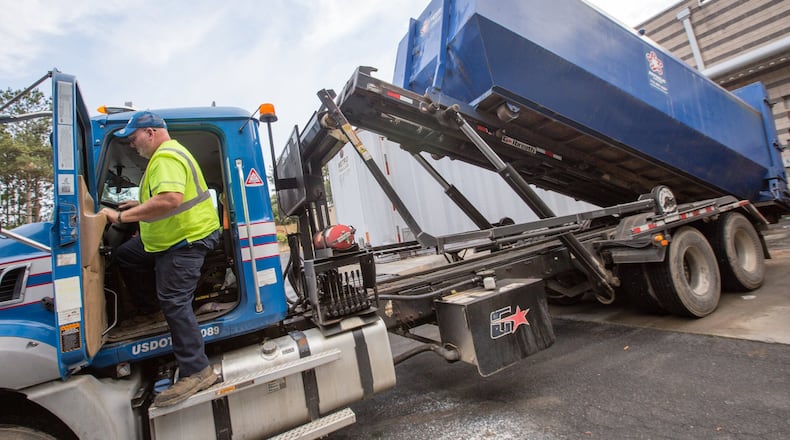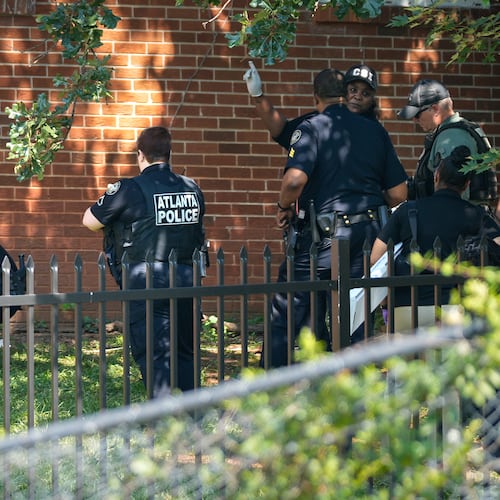Several days ago, someone walked into Augustine Lenox’s office to chat.
Lenox is a property manager at a DeKalb County apartment community and she says the visitor wanted to talk about having brought her mother, whom the visitor suspected had pneumonia, up from Florida.
The visitor ignored the shipping tape on the floor marking a six-foot separation. The only thing that divided them was Lenox’s desk.
For at least three weeks now, Lenox has been trying to limit the traffic inside her office at the Alexander at Stonecrest. Lenox says she has argued with management that her job and that of her staff can be done without direct contact with residents, or the dozens of people who come in daily looking for an apartment.
“We can do the job from the office with the door closed. It is not safe to have 50-75 people coming into the office every day,” Lenox said. “Every time that door makes that ding, we are like, ‘Oh My God.’”
In this dark age of the coronavirus, Lenox’s concerns are being echoed by workers who are required to go into work but fear their employers are not doing enough to protect them.
Over the past two weeks, The Atlanta Journal-Constitution has heard from dozens of Georgians who feel they are working in unsafe environments. They ranged from call center to hospital workers. Their main complaints were inadequate social distancing, not being allowed to work from home and lack of hazard pay. Almost all declined to speak on the record, for fear of losing their jobs.
The union representing workers at a Tyson Foods chicken plant in Camilla said earlier this week that two recently died from COVID-19 and accused Tyson of not doing enough to protect workers. Tyson said it is working "diligently" to ensure safety.
To manage the pandemic, Gov. Brian Kemp placed the state's 10.6 million residents under a statewide shelter-in-place order on April 3, and extended it Wednesday until the end of the month.
The order shuttered businesses ranging from gyms to theaters and bowling alleys to hair salons. But most non-critical businesses were allowed to stay open as long as they implemented 20 measures. They include ensuring six feet of distance between workers; screening workers who show signs of illness; enhancing workplace sanitation; and offering teleworking when possible.
State law enforcement officers and county sheriffs have the power to shut down businesses and nonprofits that don't comply with the order and workers throughout the state can also call a hotline to report shelter in place violations.
The U.S. Department of Labor’s Occupational Safety and Health Administration has warned employers it is illegal to retaliate against workers who report unsafe conditions. On Wednesday the Centers for Disease Control and Prevention issued new guidelines for workers exposed to the coronavirus, saying they would need to be asymptomatic to return to work.
Ben J. Mathis Jr., an Atlanta employment attorney who represents employers, said that so far companies he has observed have worked hard to adhere to the state regulations and have not been looking for “loopholes” to skirt the rules.
“My experience is that people are taking this seriously and care a great deal. I am seeing a change in behavior,” said Mathis, a managing partner at Freeman Mathis & Gary LLP.
Home Depot is limiting the number of customers in its stores, while Walmart has made all of its aisles one-way and is providing gloves for all of its workers. Kroger and Publix have installed plexiglass shields between customers and clerks, and several companies are adding hazard pay for front-line workers.
Not everyone is satisfied.
Management at the Veterans Crisis Line in Atlanta denied employees the ability to telework after an employee tested positive for the coronavirus, according to Marcia Blane, president of the American Federation of Government Employees Local 518, which represents the workers.
“On any given shift there are nearly 70 employees, without any personal protective equipment, working in cubicles less than six feet apart, and sharing a single, working elevator,” Blane said.
The Department of Veterans Affairs did not return calls seeking comment.
For 22 years Greg Dowis, a sanitation worker in Cumming, has been collecting trash and waste for Republic Services from residences and most recently, hospitals and apartment complexes. He said that the company is not providing basic supplies like cleaning supplies and hand sanitizer, items that most people took for granted months ago. He also said they had not been provided puncture-proof gloves, masks, hazard suits or face shields.
“We are very nervous about getting the coronavirus,” said Dowis, adding he buys his own wipes and wipes down the cab of his truck constantly.
With more than 35,000 sanitation workers nationwide, Republic Services is the second-largest private waste collection company in the United States. Chuck Stiles, director of the solid waste and recycling division at the Teamsters and vice president of Local 728 in Atlanta, said he has about 330 Republic Services workers in Atlanta.
“We have guys in Cumming and McDonough who are ready to walk off the job because of the safety concerns,” Stiles said. “I want safe equipment for these guys. We are just asking for protection.”
A spokesman for Republic Services said in an email that the company is “continuously evaluating the situation to help keep our employees healthy” and “confident that we have the necessary plans and protocols in place for protecting employees.” He said the company is providing cleaning supplies, puncture-proof gloves and face and eye protection.
According to the Bureau of Labor Statistics, refuse and recyclable material collecting is the fifth-most dangerous job in America, killing more people than police officers, firefighters or miners.
Jerome Westpoint, who works for Republic Services out of McDonough, said his unit has been provided latex gloves and Lysol, but that it is not nearly enough. He said the unit has resorted to buying their own supplies, like N95 masks.
Lenox, the DeKalb County apartment manager, said that her two maintenance workers still have to go into apartments without masks, which have not been provided. She and another person in the office walk potential renters through open apartments. She said she also has not been provided any hand sanitizer and disinfectant for her office.
“Nobody minds working, we are just hoping for a better way,” Lenox said. “Everyone feels like their life is on the line. If I die, they are going to replace me pretty quickly and it will be business as usual. But it won’t be business as usual for my family.”
Signature Management, which owns the apartment complex, did not return calls seeking comment.
About the Author
Keep Reading
The Latest
Featured







